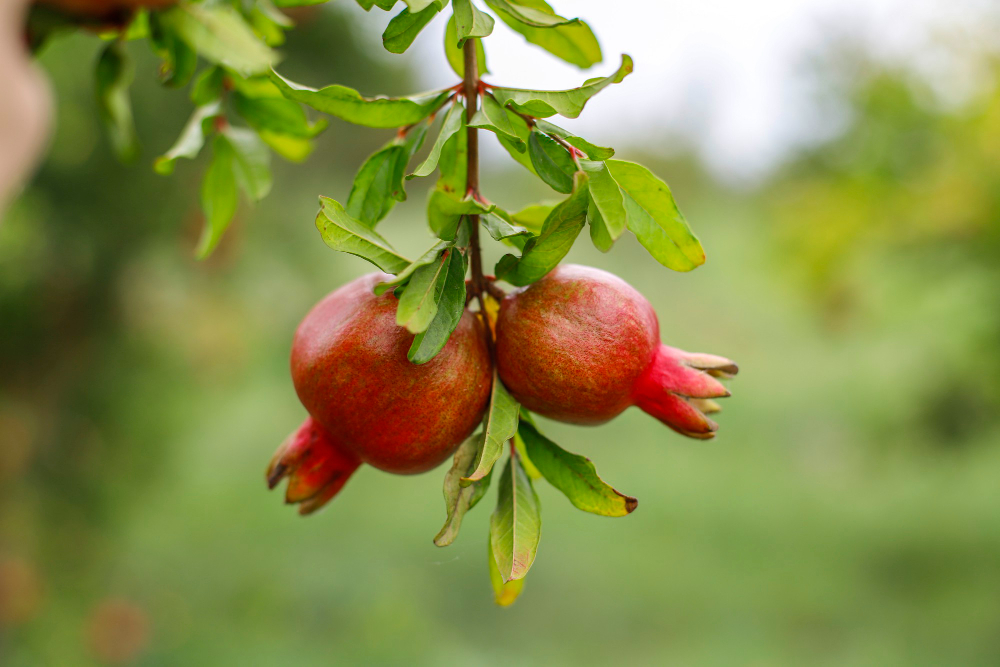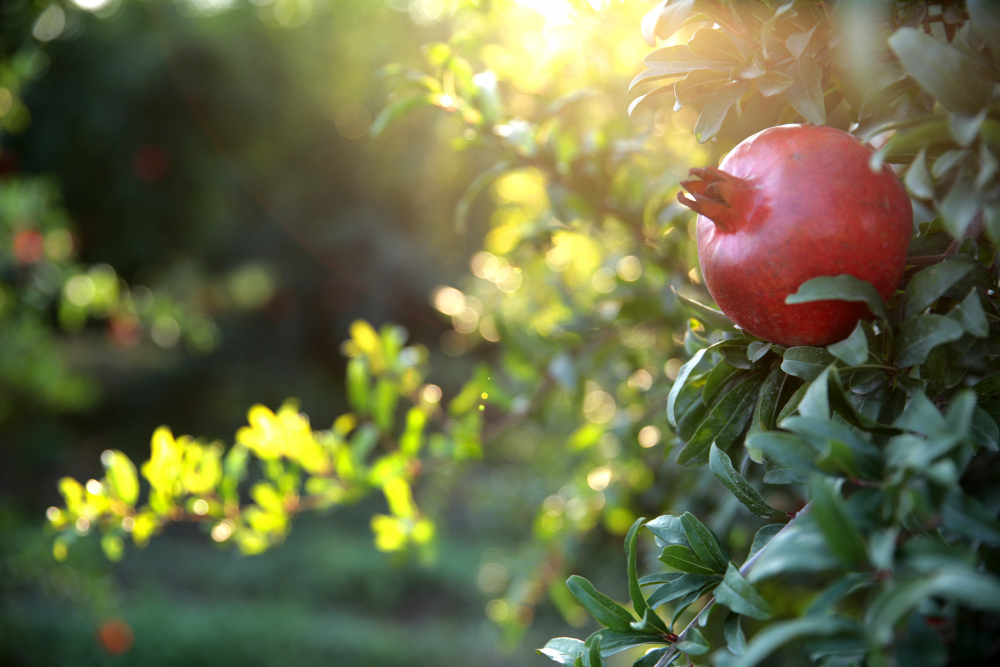Atulya Vanam's MightyPomegranate: Unveiling its Medicinal Marvels and Culinary Delights Across Healing Traditions
The Pomegranate tree (Punica granatum) stands as an emblem of fertility and vitality, offering not only its jewel-like fruit but also a plethora of therapeutic benefits through its leaves, fruit, bark, roots, and flowers.
In this comprehensive blog, we embark on a captivating journey to explore the multifaceted uses of the Pomegranate tree across various medical systems, including Modern Medicine, Ayurveda, Unani, Homeopathy, Siddha, and its diverse range of applications. Additionally, we delve into the distinct Pomegranate varieties flourishing in India.
Medicinal Value
Modern Medicine:
Fruit (Pomegranate): Beyond its tangy-sweet taste, the Pomegranate’s fruit is a nutritional powerhouse, teeming with antioxidants and nutrients that contribute to heart health, immune support, and overall well-being.
Seeds: Pomegranate seeds and their extract contain potent antioxidants like punicalagins and anthocyanins, which have garnered attention for their potential health benefits.
Ayurveda:
Fruit (Pomegranate): Ayurveda cherishes Pomegranate’s astringent and cooling attributes, using it to balance pitta dosha. It supports digestion, detoxification, and rejuvenation.
Flowers: Pomegranate flowers are employed in Ayurvedic remedies for their potential in managing conditions like diarrhea and intestinal disorders.
Unani:
Fruit (Pomegranate): Unani recognizes Pomegranate’s nutritive value, considering it a source of energy that contributes to overall wellness
Homeopathy:
Fruit (Pomegranate): While not a primary remedy, Homeopathy may integrate Pomegranate into preparations targeting specific symptoms or conditions.
Siddha:
Fruit (Pomegranate): In Siddha medicine, Pomegranate’s cooling nature is valued for its potential to support digestion and promote overall health.
General Uses
Culinary Excellence: Pomegranate seeds’ burst of flavor and vibrant color make them a popular addition to salads, desserts, and beverages.
Cosmetic and Skincare: Pomegranate extracts are often found in skincare and cosmetic products due to their potential to moisturize, protect, and promote youthful skin.
Traditional Remedies: Pomegranate bark and leaves are incorporated into traditional remedies for their astringent and anti-inflammatory properties.
Dyeing: Pomegranate peel and flowers have been used historically to produce natural dyes.
Symbolism and Cultural Significance: Pomegranates hold symbolic value in many cultures, often representing fertility, abundance, and prosperity.
Pomegranate Varieties in India
Bhagwa: Renowned for its deep red arils and sweet-tart flavor, Bhagwa Pomegranate is cherished for its juice quality.
Kesar: With its saffron-hued arils and delightful taste, Kesar Pomegranate is a popular choice in several regions.
Ganesh: Named after the revered deity, Ganesh Pomegranate is appreciated for its bold flavor and vibrant color.
Mrudula: Recognized for its soft seeds and rich taste, Mrudula Pomegranate is often consumed fresh.
Jyoti: With its appealing sweetness and versatility, Jyoti Pomegranate is a favored variety for culinary creations.



More about Pomegranate
Pomegranate trees (Punica granatum) possess a range of extraordinary qualities that contribute to their allure and significance. Here are some intriguing facts about pomegranate trees:
Ancient Symbolism: Pomegranates have a rich history and cultural symbolism, often associated with fertility, abundance, and life in various civilizations throughout history.
Jewel-Like Fruit: Pomegranate fruits are adorned with jewel-like seeds called arils, each containing a burst of sweet-tart flavor and vibrant color.
Nutrient-Rich: Pomegranate arils are packed with antioxidants, vitamins (such as vitamin C and vitamin K), and dietary fiber, contributing to potential health benefits.
Culinary Versatility: Pomegranate arils can be enjoyed fresh, added to salads, used as a garnish, pressed into juice, or even incorporated into savory dishes.
Medicinal Uses: Pomegranates have been used in traditional medicine for their potential benefits, including heart health and anti-inflammatory properties.
Cultural Significance: Pomegranates hold cultural importance in many societies, often featured in art, literature, and religious rituals.
Historic References: Pomegranates are mentioned in ancient texts and myths, such as the Greek myth of Persephone, adding to their timeless allure.
Fruit of Prosperity: In some cultures, pomegranates symbolize prosperity and good luck, making them a popular gift during festive occasions.
Diverse Varieties: There are multiple varieties of pomegranates, each with distinct characteristics, such as fruit size, color, and flavor.
Global Presence: Pomegranates are grown in various regions around the world, from Mediterranean climates to subtropical and tropical areas.
Ornamental Value: Pomegranate trees bear attractive, vibrant flowers that add beauty to gardens and landscapes.
Natural Dye: Pomegranate peels and arils have been historically used as natural dyes for textiles and crafts.
Folk Remedies: Pomegranate derivatives, such as peel extracts, have been explored for their potential role in traditional remedies and health tonics.
Traditional Beverages: Pomegranate juice is enjoyed in various cultures and is believed to offer refreshing and healthful properties.
Propagation Methods: Pomegranate trees can be propagated from seeds, cuttings, or grafting. Grafted trees are preferred for consistent fruit quality.
Culinary Pairings: Pomegranate’s unique flavor profile pairs well with a range of ingredients, enhancing both sweet and savory dishes.
Culinary Traditions: Pomegranate seeds are featured in dishes from Middle Eastern cuisine to Indian, Greek, and Mediterranean fare.
These extraordinary facts highlight the multifaceted nature of pomegranate trees, from their cultural significance and culinary versatility to their potential health benefits and historic symbolism. Pomegranate trees continue to captivate people’s imagination and remain cherished as both a delightful fruit and a symbol of life’s abundance.
Conclusion
The Pomegranate tree, an emblem of vitality and abundance, transcends its role as a fruit-bearing entity. Its leaves, bark, roots, flowers, and multifaceted applications weave a tapestry across diverse medical systems and cultural practices. From Ayurveda’s ancient wisdom to modern medical validation, the Pomegranate tree’s contributions flourish. By embracing the harmony of traditional knowledge and contemporary exploration, we unveil the myriad ways in which the Pomegranate tree enriches our lives—nurturing not only our bodies but also our cultural heritage and the natural environment.
